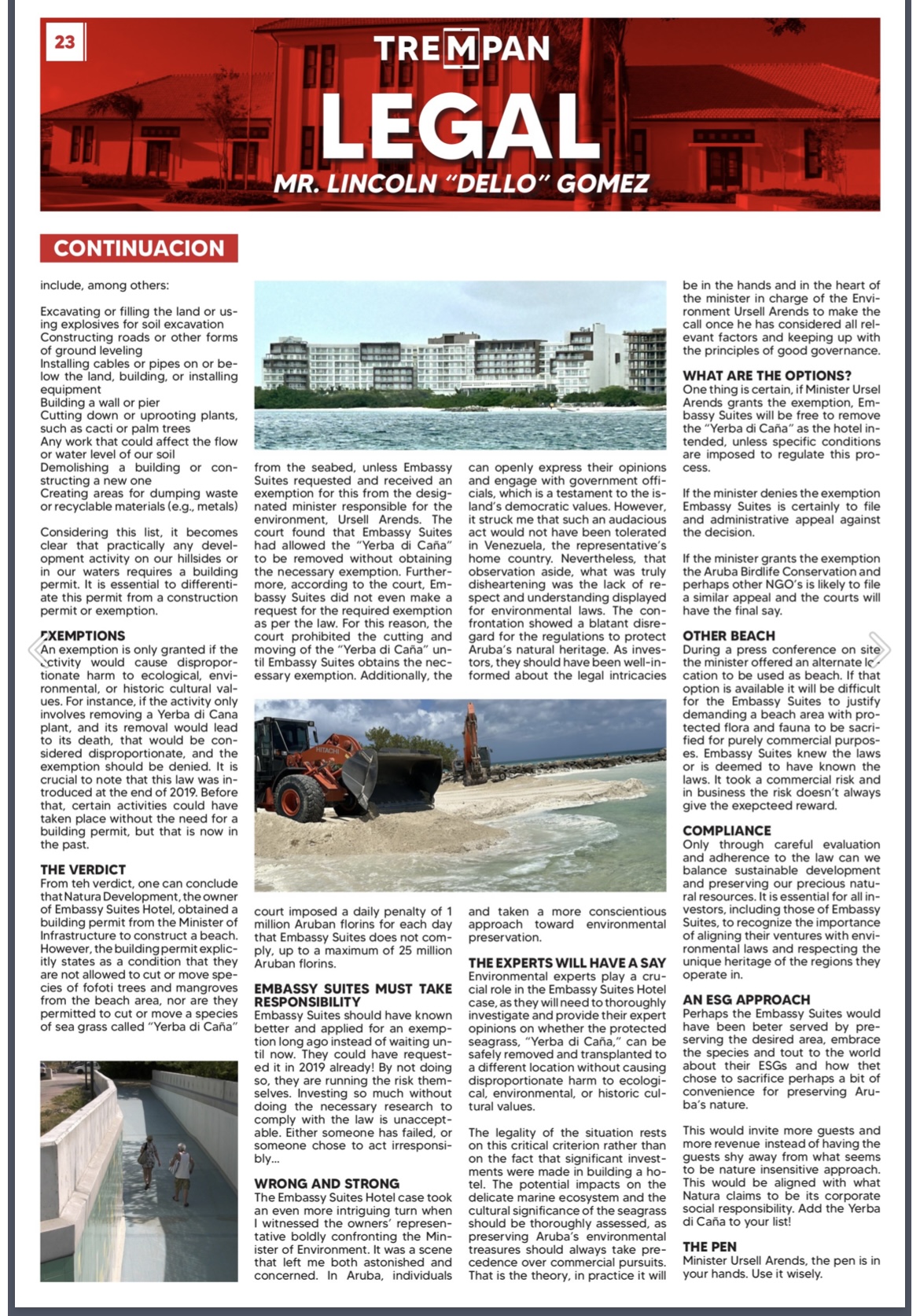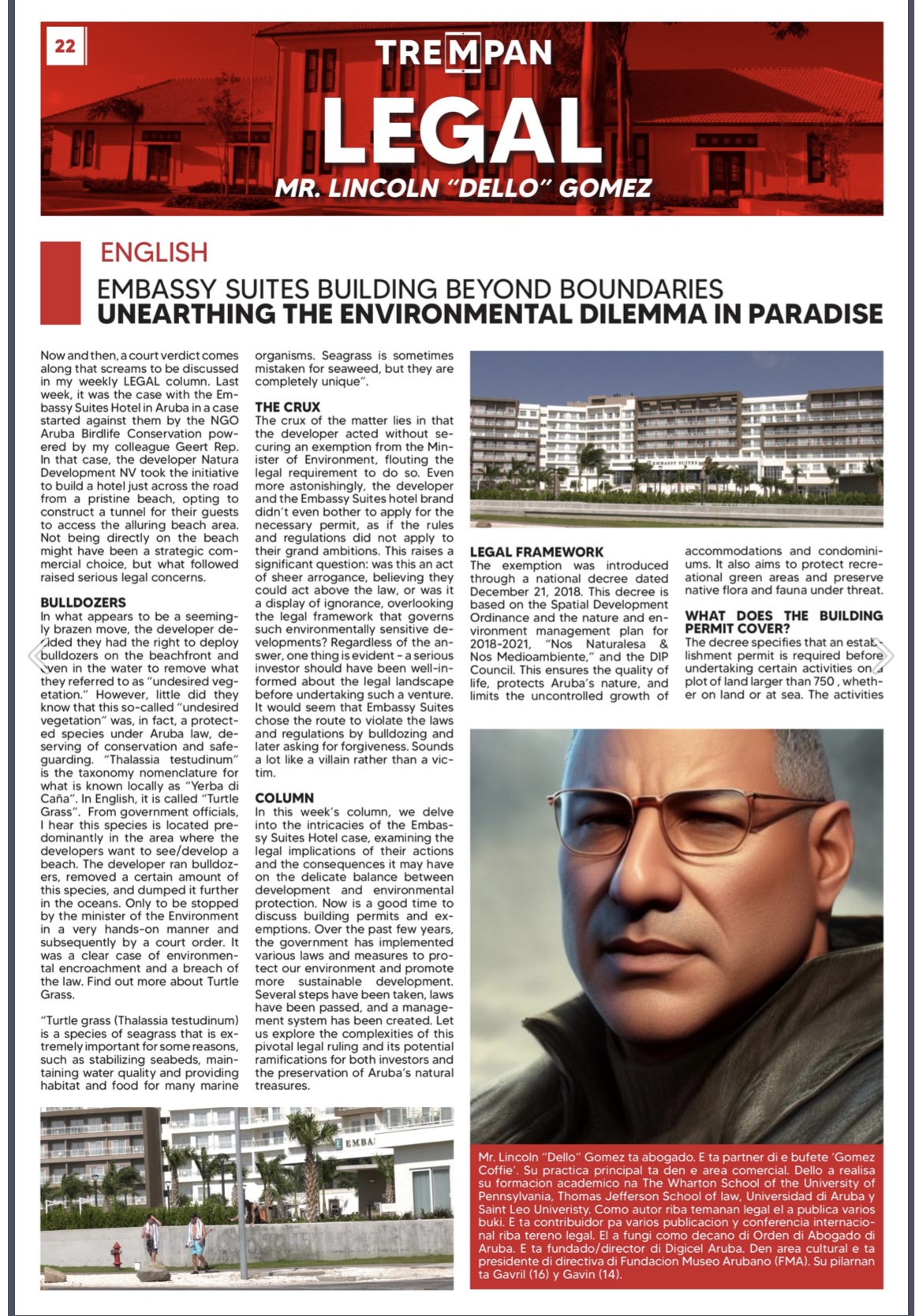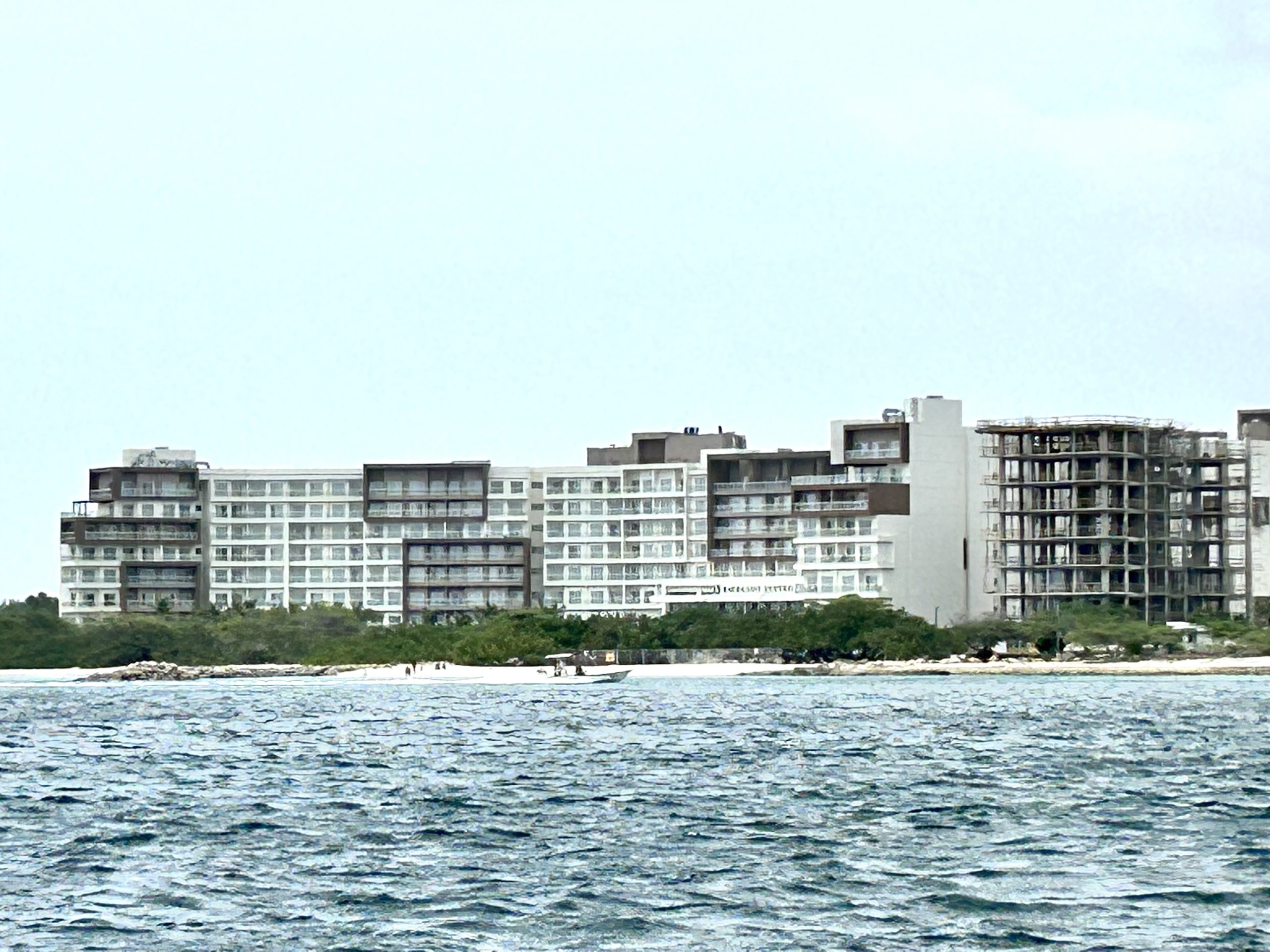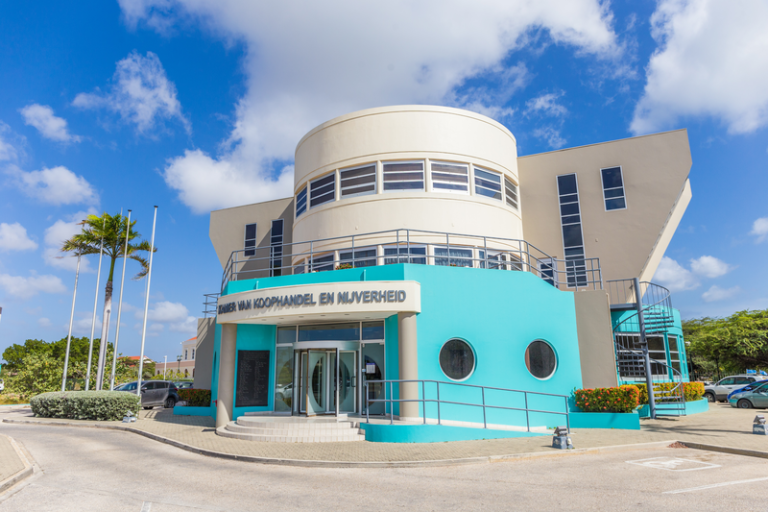Embassy Suites Building Beyond Boundaries: Unearthing the environmental dilemma in paradise
Now and then, a court verdict comes along that screams to be discussed in my weekly LEGAL column. Last week, the case was with the Embassy Suites Hotel in Aruba in a case started against them by the NGO Aruba Birdlife Conservationpowered by my colleague Geert Rep. In that case, the developer Natura Development NV took the initiative to build a hotel just across the road from a pristine beach, opting to construct a tunnel for their guests to access the alluring beach area. Not being directly on the beach might have been a strategic commercial choice, but what followed raised serious legal concerns.
Bulldozers
In what appears to be a seemingly brazen move, the developer decided they had the right to deploy bulldozers on the beachfront and even in the water to remove what they referred to as “undesired vegetation.” However, little did they know that this so-called “undesired vegetation” was, in fact, a protected species under Aruba law, deserving of conservation and safeguarding. “Thalassia testudinum” is the taxonomy nomenclature for what is known locally as “Yerba di Caña”. In English, it is called “Turtle Grass”. From government officials, I hear this species is located predominantly in the area where the developers want to see/develop a beach. The developer ran bulldozers, removed a certain amount of this species, and dumped it further in the oceans. Only to be stopped by the minister of the Environment in a very hands-on manner and subsequently by a court order. It was a clear case of environmental encroachment and a breach of the law. Find out more about Turtle Grass.
“Turtle grass (Thalassia testudinum) is a species of seagrass that is extremely important for some reasons, such as stabilizing seabeds, maintaining water quality and providing habitat and food for many marine organisms. Seagrass is sometimes mistaken for seaweed, but they are completely unique”.
The crux
The crux of the matter lies in that the developer acted without securing an exemption from the Minister of Environment, flouting the legal requirement to do so. Even more astonishingly, the developer and the Embassy Suites hotel brand didn’t even bother to apply for the necessary permit, as if the rules and regulations did not apply to their grand ambitions. This raises a significant question: was this an act of sheer arrogance, believing they could act above the law, or was it a display of ignorance, overlooking the legal framework that governs such environmentally sensitive developments? Regardless of the answer, one thing is evident – a serious investor should have been well-informed about the legal landscape before undertaking such a venture. It seems that Embassy Suites chose the route to violate the laws and regulations first by bulldozing and later asking for forgiveness. Sounds a lot like a villain rather than a victim.
Column
In this week’s column, we delve into the intricacies of the Embassy Suites Hotel case, examining the legal implications of their actions and the consequences it may have on the delicate balance between development and environmental protection. Now is a good time to discuss building permits and exemptions. Over the past few years, the government has implemented various laws and measures to protect our environment and promote more sustainable development. Several steps have been taken, laws have been passed, and a management system has been created. Let us explore the complexities of this pivotal legal ruling and its potential ramifications for both investors and the preservation of Aruba’s natural treasures.
Legal Framework
The exemption was introduced through a national decree dated December 21, 2018. This decree is based on the Spatial Development Ordinance and the nature and environment management plan for 2018-2021, “Nos Naturalesa & Nos Medioambiente,” and the DIP Council. This ensures the quality of life, protects Aruba’s nature, and limits the uncontrolled growth of accommodations and condominiums. It also aims to safeguard recreational green areas and preserve native flora and fauna under threat.
What Does the Special Exemption Cover?
The decree specifies that a special exemption(is required before undertaking certain activities on a plot of land larger than 750m2 , whether on land or at sea. The activities include, among others:
- Excavating or filling the land or using explosives for soil excavation
- Constructing roads or other forms of ground leveling
- Installing cables or pipes on or below the land, building, or installing equipment
- Building a wall or pier
- Cutting down or uprooting plants, such as cacti or palm trees
- Any work that could affect the flow or water level of our soil
- Demolishing a building or constructing a new one
- Creating areas for dumping waste or recyclable materials (e.g., metals)
Considering this list, it becomes clear that practically any development activity on our hillsides or in our waters requires a building permit. It is essential to differentiate this permit from a construction permit or exemption.
Exemptions
An exemption is only granted if the activity would cause disproportionate harm to ecological, environmental, or historic cultural values. For instance, if the activity only involves removing a Yerba di Cana plant, and its removal would lead to its death, that would be considered disproportionate, and the exemption should be denied. It is crucial to note that this law was introduced at the end of 2019. Before that, certain activities could have taken place without the need for a building permit, but that is now in the past.
The verdict
From the verdict, one can conclude that Natura Development, the owner of Embassy Suites Hotel, obtained a building permit from the Minister of Infrastructure to construct a beach. However, the building permit explicitly states as a condition that they are not allowed to cut or move species of fofoti trees and mangroves from the beach area, nor are they permitted to cut or move a species of seagrass called “Yerba di Caña” from the seabed, unless Embassy Suites requested and received an exemption for this from the designated minister responsible for the environment, Ursell Arends. The court found that Embassy Suites had allowed the “Yerba di Caña” to be removed without obtaining the necessary exemption. Furthermore, according to the court, Embassy Suites did not even request the required exemption as per the law. For this reason, the court prohibited the cutting and moving of the “Yerba di Caña” until Embassy Suites obtains the necessary exemption. Additionally, the court imposed a daily penalty of 1 million Aruban florins for each day that Embassy Suites does not comply, up to a maximum of 25 million Aruban florins.
Embassy Suites Must Take Responsibility
Embassy Suites should have known better and applied for an exemption long ago instead of waiting until now. They could have requested it in 2019 already! By not doing so, they are running the risk themselves. Investing so much without doing the necessary research to comply with the law is unacceptable. Either someone has failed, or someone chose to act irresponsibly…
Wrong and Strong
The Embassy Suites Hotel case took an even more intriguing turn when I witnessed the owners’ representative boldly confronting the Minister of Environment. It was a scene that left me both astonished and concerned. In Aruba, individuals can openly express their opinions and engage with government officials, which is a testament to the island’s democratic values. However, it struck me that such an audacious act would not have been tolerated in Venezuela, the representative’s home country. Nevertheless, that observation aside, what was truly disheartening was the lack of respect and understanding displayed for environmental laws. The confrontation showed a blatant disregard for the regulations to protect Aruba’s natural heritage. As investors, they should have been well-informed about the legal intricacies and taken a more conscientious approach toward environmental preservation.
The experts will have a say
Environmental experts play a crucial role in the Embassy Suites Hotel case, as they will need to thoroughly investigate and provide their expert opinions on whether the protected seagrass, “Yerba di Caña,” can be safely removed and transplanted to a different location without causing disproportionate harm to ecological, environmental, or historic cultural values. The legality of the situation rests on this critical criterion rather than on the fact that significant investments were made in building a hotel. The potential impacts on the delicate marine ecosystem and the cultural significance of the seagrass should be thoroughly assessed, as preserving Aruba’s environmental treasures should always take precedence over commercial pursuits. That is the theory, in practice, it will be in the hands and in the heart of the minister in charge of the Environment Ursell Arends to make the call once he has considered all relevant factors and keeping up with the principles of good governance.
What are the options?
One thing is certain, if Minister Ursel Arends grants the exemption, Embassy Suites will be free to remove the “Yerba di Caña” as the hotel intended, unless specific conditions are imposed to regulate this process.
- If the minister denies the exemption Embassy Suites is certainly to file and administrative appeal against the decision.
- If the minister grants the exemption the Aruba Birdlife Conservation and perhaps other NGO’s is likely to file a similar appeal and the courts will have the final say.
Other beach
During a press conference on-site, the minister offered an alternate location to be used as beach. If that option is available, it will be difficult for the Embassy Suites to justify demanding a beach area with protected flora and fauna to be sacrificed for purely commercial purposes. Embassy Suites knew the laws or is deemed to have known the laws. It took a commercial risk; in business, the risk doesn’t always give the expected reward.
Compliance
Only through careful evaluation and adherence to the law can we balance sustainable development and preserving our precious natural resources. It is essential for all investors, including those of Embassy Suites, to recognize the importance of aligning their ventures with environmental laws and respecting the unique heritage of the regions they operate in.
An ESG approach
Perhaps the Embassy Suites would have been better served by preserving the desired area, embracing the species and touting to the world about their ESGs and how they chose to sacrifice perhaps a bit of convenience for preserving Aruba’s nature. This would invite more guests and more revenue instead of having the guests shy away from what seems to be nature insensitive approach. This would be aligned with what Natura claims to be its corporate social responsibility. Add the Yerba di Caña to your list!
The pen
Minister Ursell Arends, the pen is in your hands. Use it wisely
















